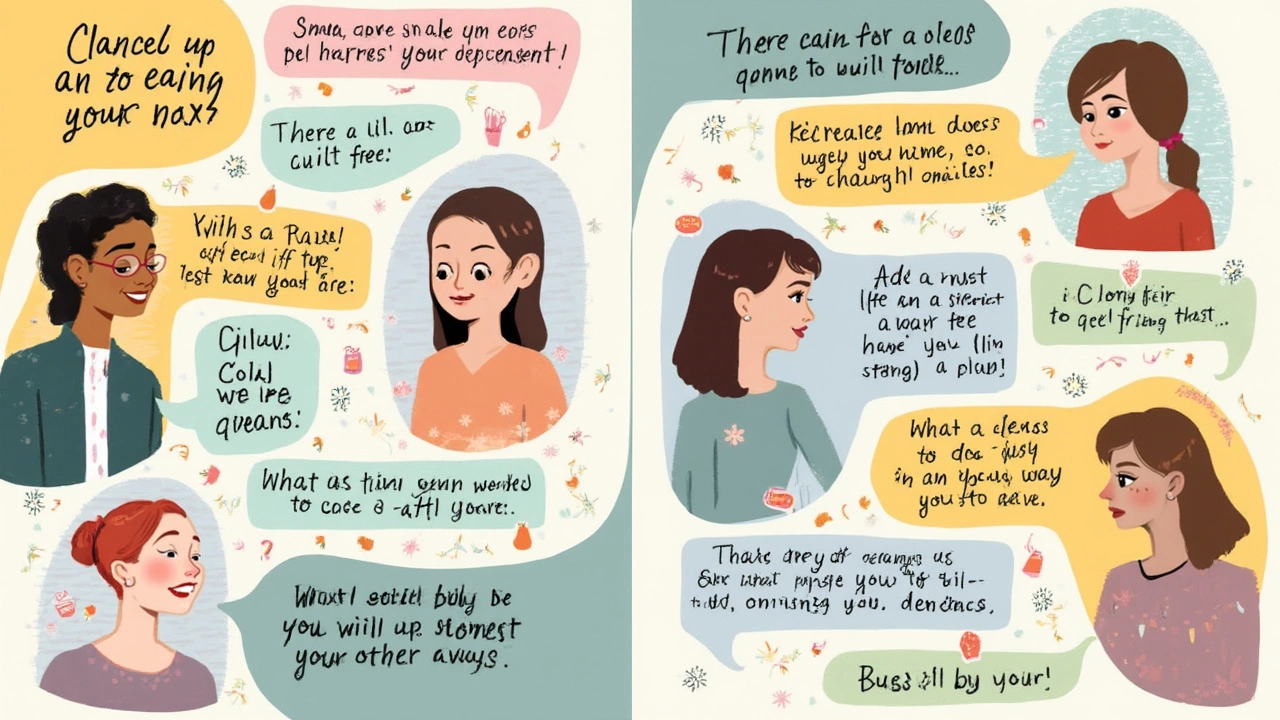How to Cancel a Last-Minute Trip: Practical Steps and Honest Excuses
 Jun, 26 2025
Jun, 26 2025
It’s wild how plans can swing from I’m-so-excited to oh-no-I-can’t-make-it in a matter of hours. You promise yourself you’ll be up for that spontaneous road trip, maybe even buy the cute portable charger. But then, reality smacks you with an unexpected work deadline, your cat throws up on your shoes, or your energy just isn’t there. Pulling out of a last-minute trip isn’t just about awkward texts—it’s about saving face, keeping friends, and, honestly, keeping yourself sane.
Why People Cancel Trips Last Minute—and Why It’s Never Simple
Life’s unpredictable. According to Expedia’s 2023 Vacation Deja Vu Report, over 59% of travelers bailed on at least one planned trip last year, most citing illness, work emergencies, family obligations, or finances. That's most of us! You might think flaking is rare, but it’s practically a rite of passage in adulthood. Sometimes, it’s an emotional twist: anxiety about travel, fear of missing out on things at home, or just feeling stretched too thin. I’ve personally felt the guilt gnawing at me when my friend group’s group chat lights up with packing lists and I know I can’t swing it. Whether it’s your mental health, a pet crisis (hello, Whiskers peed on my suitcase once), or just plain burnout—the reasons are real, and much more common than people admit.
Maybe you got hit with an unexpected expense. According to the Federal Reserve, around 37% of Americans would struggle to cover a $400 emergency. So, an abrupt car repair can torpedo your travel fund overnight. Or, you’ve got an unsympathetic boss who suddenly needs you to cover a shift (yep, happens in summer all the time). Cancellations can be especially tough when everyone else is hyped, or you’re the driver or linchpin in the plan. That pressure? Totally real, but it shouldn’t override your boundaries—or your finances.
Communicating Your Cancellation Without Burning Bridges
Okay, so you’ve decided to pull the plug. First: breathe. Your friends, family, or coworkers might be a little disappointed, but honest, respectful communication goes a long way. The trick? Don’t ghost. Disappearing just creates confusion and might leave others stranded. Ideally, you want to let everyone know as early as possible. A study from Harvard found that giving at least a 24-hour heads up leads to better outcomes in group travel plans—but even an hour’s notice is better than none.
Here’s a good formula I swear by:
- Be honest (without oversharing your every anxiety or stomach issue)
- Show gratitude for the invite and excitement for future plans
- Apologize sincerely, not melodramatically
- If possible, help with solutions: a backup driver, or sending that Airbnb info you organized
For example, I once had to cancel a hiking weekend because Whiskers needed an emergency vet visit. I texted my friends right away, offered to send over all trail maps I’d researched, and promised to help plan the next trip. I added, “I’ll bring snacks for everyone, my treat, next round.” It did wonders—I was off the hook and no one resented me.
Worried about how to word your message? Keep it simple:
- “I’m so sorry, I can’t make the trip tomorrow—something urgent came up at home. I’m bummed to miss the adventure but hope you all have a blast. Let’s catch up when you’re back!”
- “Bad timing! My boss needs me to work unexpectedly. Have the best time, and share pics so I can live vicariously.”
Leading travel psychologist Dr. Linda Blair says people tend to appreciate sincerity way more than wild, convoluted excuses. If you have a tendency to people-please (guilty), remember: boundaries are healthy, and real friends stick around.

Honest Excuses vs. Social White Lies: Navigating the Grey Area
Sometimes, honesty really is the best policy—other times, it’s a minefield. Your group might be understanding about your migraine, but maybe not about your need for a solo mental health day. About 68% of people reported to Psychology Today that they use a ‘softened’ reason to avoid hurting feelings or justifying decisions. You don’t need to spill every detail. The key is to choose an excuse that’s believable given your usual personality and life (if you never mention your dog but suddenly blame it for skipping Vegas, people notice).
Here are a few accepted, low-drama reasons that get the job done, whether true for you or not:
- Family obligation popped up
- Sudden work emergency
- Health—yours or a close one (don’t overuse; people remember!)
- Unexpected expense—car breakdown, plumbing disaster
- Travel issues—lost ID, transportation fell through
Got a group who’s tough on flakes? Sometimes a social white lie can save you from endless group chat debates. But big fibs breed mistrust—remember, word travels. If you genuinely just aren’t up for it, say so, with compassion. I once avoided making up a story and said, “I’m feeling totally wiped and know I won’t be good company. I care about our friendship too much to fake it.” The honesty paid off—no bridges burned.
Financial and Practical Fallout from Cancelling Last Minute
Now, here’s the up-close cost. Travel plans aren’t just emotional—they’re transactional. Canceling last minute can mean lost deposits, angry Airbnb reviews, or split costs that leave your friends paying extra. According to the U.S. Travel Association, non-refundable tickets cost U.S. travelers over $2.7 billion every year. Airlines, hotels, and tour companies now have varying cancellation policies, especially since the pandemic chaos of 2020; some offer free 24-hour cancellation, but others will pocket your cash lightning-fast.
| Type of Booking | Average Cancellation Fee (2024) |
|---|---|
| Domestic Airline | $75–$200 |
| International Airline | $200–$600 |
| Hotel (non-refundable) | First night or full stay |
| Vacation Rental (Airbnb/VRBO) | Varies—often 50% if <72 hours |
| Car Rental | $50–$150 |
Don’t forget group dynamics. When you’re the linchpin—like when Ethan and I coordinate road trips with friends and we cancel—it throws people. I learned to always prepay my share of group bookings, so no one’s left with my bill. That way, it’s about my absence, not my debt.
If your reason for canceling is illness or a true emergency, ask about travel insurance or credit card protection. About 39% of US travelers bought insurance in 2023; some policies cover last-minute bailouts for illness, emergencies, or pandemic-related stuff. Otherwise, you might be able to get partial refunds if you explain the situation directly—a little kindness in an email can sometimes unlock exceptions, especially if you’re polite and quick.

How to Prevent Regret (and Make It Up Next Time)
Feeling guilty is human. Chances are, you’ll scroll through friends’ fun photos wishing you’d sucked it up and gone. Or worse—you’re the only one not tagged, and the FOMO hits hard. Here’s how to shake off the shame and set the stage for smoother plans next time.
- Reach out after the trip: Ask how it went, show interest, don’t make it weird.
- Offer to organize a future hangout. Suggest an activity in a few weeks, even just coffee or a movie.
- Send a surprise (like snacks for the drive or a note) before bailing—it eases the sting.
- Accept that sometimes, you’ll need to sit with disappointment. Your need to cancel is valid, and pretending otherwise just breeds resentment.
- If possible, be upfront about your travel tolerance going forward—if you’re often on the fence, friends can adapt.
Most importantly, remember missing one trip doesn’t define your friendship or worth. Life’s messy, and sometimes, you have to choose yourself—or your puking cat—over peer pressure and plans.
So next time you’re on the verge of dropping out last minute, go easy on yourself. Be honest, be kind, and protect your peace. Your best friends will still want you in their group chat—even if you’re at home in your pajamas, binge-watching and making up for missed adventures with extra love for Whiskers.
